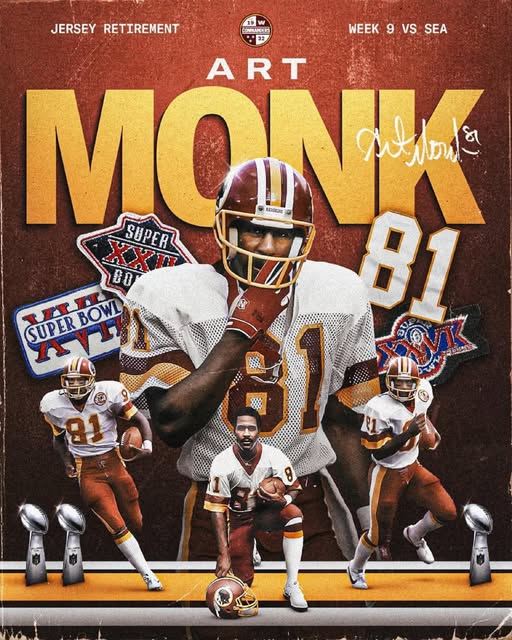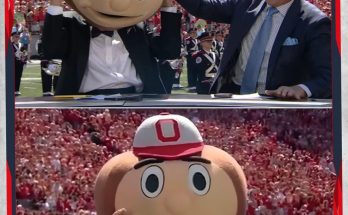The Washington Commanders have announced that they will honor one of the most iconic players in franchise history by retiring the jersey number of Hall of Fame wide receiver and three-time Super Bowl Champion Art Monk. The ceremony will take place during the team’s Week 9 home game against the Seattle Seahawks, marking a historic moment for both the organization and its devoted fanbase. This tribute is not just about numbers or statistics. It is a salute to a player who helped define a golden era of Washington football and whose legacy continues to inspire generations of athletes and fans alike.
Art Monk is far more than a former player. He is a symbol of excellence, professionalism, and perseverance. Throughout a 16-year NFL career—14 of them spent in Washington—Monk distinguished himself not only as one of the most consistent and productive receivers of all time, but as a man who played the game with quiet dignity and tireless work ethic. His name became synonymous with clutch plays, precise routes, and the kind of reliable performance that every quarterback dreams of having in a top target. Now, decades after his final reception in burgundy and gold, his number 81 will take its rightful place among the franchise’s most sacred icons, never to be worn again.
The decision to retire Monk’s jersey number is a significant one. In the long history of the franchise, very few players have received this ultimate honor. Monk joins an elite group whose names and numbers represent the very foundation of Washington football. It is a recognition not just of individual achievement, but of what that player meant to the identity and culture of the team. For those who watched him play, there was never any doubt that Monk belonged in that company. He was, simply put, the standard.
Originally selected in the first round of the 1980 NFL Draft out of Syracuse University, Monk quickly became an impact player. In his rookie season, he caught 58 passes for 797 yards, setting a franchise record for a first-year player. That performance was just the beginning of a career that would see him become the NFL’s all-time leader in receptions by the time he retired. Monk’s role in Washington’s offensive success during the 1980s and early 1990s cannot be overstated. He was the heartbeat of a passing game that contributed to three Super Bowl titles, and he formed one-third of the legendary “Posse” trio alongside fellow receivers Gary Clark and Ricky Sanders.
Monk’s style of play was not flashy, but it was brutally effective. He wasn’t the fastest receiver in the league, nor the loudest, but he may have been the most dependable. Quarterbacks knew that if they needed a first down, Monk would find a way to get open. He was a master technician, able to read defenses, adjust his routes on the fly, and make contested catches in traffic. His ability to produce consistently across multiple seasons, with different quarterbacks and evolving offensive schemes, is a testament to his intelligence, adaptability, and tireless preparation.
When Monk retired in 1995, his final stat line was staggering: 940 receptions for 12,721 yards and 68 touchdowns. At the time, those 940 receptions were the most in NFL history. He was the first player in league history to record over 100 receptions in a season when he caught 106 passes in 1984. He also became the first wide receiver to record at least one catch in 180 consecutive games. And yet, despite these remarkable achievements, it took several years for Monk to be enshrined in the Pro Football Hall of Fame. It wasn’t until 2008 that he was inducted, an omission that frustrated countless fans and former players who believed he had earned the honor long before.
During his Hall of Fame induction speech, Monk remained true to form—humble, soft-spoken, and focused more on others than himself. He thanked his teammates, his coaches, his family, and God. He spoke about the importance of faith, perseverance, and character. It was a speech that mirrored the way he played the game: with grace and humility. That moment in Canton was the culmination of a career built on integrity and quiet excellence. Now, with the retirement of his jersey, that legacy will be immortalized once again, this time within the walls of FedExField, where future generations of Commanders players and fans will be reminded of what number 81 represents.
The Week 9 game against the Seattle Seahawks was chosen for the ceremony, and it is expected to be an emotionally charged day. The Commanders have not yet announced the full itinerary for the halftime celebration, but it is anticipated that many of Monk’s former teammates, coaches, and fellow Hall of Famers will be in attendance. Highlights from his career will be shown on the big screen, and Monk himself is expected to address the crowd. It will be a moment to reflect on a glorious past, but also to connect it to the present and future of a team that is seeking to restore its once-proud identity.
Fans who watched Monk during the team’s championship years remember a player who was never too big for the moment, who never made it about himself, and who always put the team first. He was often overshadowed by flashier players in the media, but he never let that bother him. He let his play do the talking, and it spoke volumes. He was the kind of leader who didn’t need to raise his voice in the locker room to be heard. His actions carried the weight of his words, and his teammates responded in kind. Players like Doug Williams, Joe Theismann, and Mark Rypien have all credited Monk with being one of the most dependable teammates they ever had.
Even long after his playing days ended, Monk has continued to be a force for good. He co-founded the Good Samaritan Foundation, which provides educational programs and mentorship to underprivileged youth. He has stayed connected to the community, speaking at schools, attending team events, and quietly supporting causes that matter. His commitment to giving back is a natural extension of who he was as a player—someone who made those around him better and never sought the spotlight for himself.
The decision to retire Monk’s number also comes at a time when the Commanders are actively working to reestablish a connection with their storied past. Under new ownership and leadership, the franchise is seeking to rebuild both its on-field success and its relationship with fans who have endured years of instability. Honoring a player like Monk is a way to reinforce the values the team hopes to embrace moving forward: discipline, humility, excellence, and accountability. By lifting number 81 into the stadium rafters, the organization is not just commemorating a player—they are reaffirming an identity.
Art Monk’s career may have ended in 1995, but his influence has never waned. To this day, young receivers study his tape, looking to emulate his route running, his footwork, his toughness over the middle. Coaches reference his consistency and preparation as a model for younger players. Fans still wear his jersey proudly to games, remembering the moments that defined a generation of Washington football. And now, that jersey will hang permanently as a symbol of what it means to represent the burgundy and gold at the highest level.
As Week 9 approaches, anticipation is already building. The matchup against the Seahawks promises to be an exciting game on the field, but the spotlight will belong to Art Monk. When number 81 is revealed on the stadium’s Ring of Honor and officially retired, it will be more than a celebration of football. It will be a tribute to character, to loyalty, and to greatness earned not through self-promotion, but through relentless effort and selfless dedication.
There are few players in the history of the game who have earned universal respect the way Monk has. His name evokes reverence not just from Washington fans, but from football fans everywhere who admire those who play the game the right way. He didn’t need to talk about greatness. He simply went out and proved it, again and again, year after year. Now, with this well-deserved honor, the Washington Commanders have ensured that his contributions will never be forgotten.
When the banner rises at halftime during that Week 9 game, surrounded by cheers and memories, it will stand as a reminder of the standard Art Monk set—for the team, for the league, and for the sport. His number 81, now retired, will forever symbolize a player whose greatness was measured not only in yards and catches, but in integrity and impact. It is a golden moment for Washington, and one that will be cherished for generations to come



